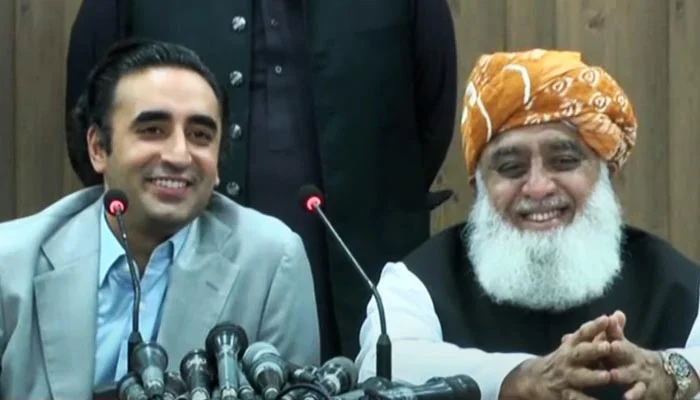Constitutional Changes
ISLAMABAD: After holding a series of meetings with Maulana Fazlur Rehman, Pakistan Peoples Party (PPP) Chairman Bilawal Bhutto-Zardari announced on Saturday that his party, along with the Jamiat Ulema-e-Islam Fazl (JUI-F), has achieved a 100% consensus on the proposed constitutional amendments.
This declaration comes as Bilawal makes a concerted effort to forge a consensus on the judicial package among various political parties, including the Pakistan Tehreek-e-Insaf (PTI).
Speaking at a public gathering in Hyderabad, Bilawal warned that he might be compelled to take a “controversial path” to ensure the passage of the 26th constitutional amendment if opposition parties do not support the judicial package.
He expressed urgency in rallying support, indicating that the legislative process could take a contentious turn without broader agreement.
Moreover, PPP lawmaker Syed Khursheed Shah reported that a special parliamentary committee—composed of both government and opposition members—had unanimously approved the draft for the 26th constitutional amendment.
Following his recent discussions with Maulana Fazlur Rehman, Bilawal reiterated his commitment to the issue, emphasizing that he is in constant contact with the JUI-F chief regarding the constitutional amendments.
Bilawal expressed his desire for Maulana Fazlur Rehman to introduce the 26th constitutional amendment bill in parliament, as the draft aligns with Rehman’s proposals.
When asked about PTI’s involvement, Bilawal expressed optimism that the JUI-F could persuade the PTI to support the constitutional amendment bill, stating, “PTI can vote for Maulana Fazlur Rehman’s draft.” He urged PTI to demonstrate its status as a legitimate political party by engaging in consensus-building and reconciliation.
Critically, Bilawal pointed out that PTI should have initiated judicial reforms during its own tenure, instead of leaving the task to the PPP.
He maintained that the government should refrain from presenting the constitutional amendment bill in parliament unless there is unanimous support from all parties involved.
In a follow-up statement, Bilawal confirmed that both the PPP and JUI-F have agreed on constitutional reforms, asserting that the joint draft was authored by Maulana Fazlur Rehman. He also commended the federal government, led by the Pakistan Muslim League-Nawaz (PML-N), for its patience and cooperation during this process.
As JUI-F spokesperson Aslam Ghauri confirmed the agreement on a joint draft of the constitutional package, he expressed appreciation for Bilawal’s efforts.
Ghauri mentioned that they are awaiting a delegation from PTI to discuss the draft, expressing hope that all political forces, including PML-N and PTI, will soon come to a consensus on judicial reforms.
The approved draft, as detailed by Geo News, outlines significant changes to the structure of the judiciary. It proposes that the commission responsible for appointing Supreme Court judges will include the Chief Justice of Pakistan, the four most senior judges, the federal law minister, the attorney general, an advocate nominated by the Pakistan Bar Council, and two members each from the Senate and the National Assembly.
Additionally, the draft includes provisions stating that courts shall not inquire into whether any advice was tendered to the president by the cabinet or the prime minister. It also suggests that constitutional benches should comprise an equal number of judges from each province.
Furthermore, it states that the Chief Justice will retire after three years, regardless of age, and proposes restructuring the Supreme Judicial Council (SJC) to include the Chief Justice, the next two most senior Supreme Court judges, and the two most senior chief justices from the high courts.


